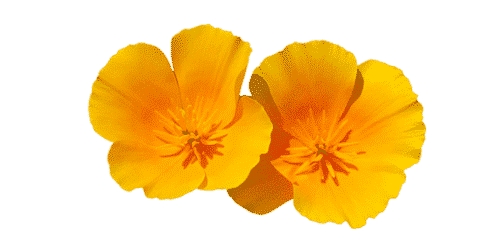
Origin
Also known as “Californian poppy”, eschscholtzia originated on the Pacific coast of the United States. This plant mainly grows on the Californian coast where it is moreover a state symbol. In the past, American Indians consumed its leaves as vegetables. Introduced to Europe in the 19th century, it was above all used as a decorative plant.
Did you know?
Eschscholtzia was named by Chamisso, French-German poet, writer and botanist, who named this plant in honour of the German doctor and naturalist Eschscholtz.1
Characteristics
Eschscholtzia is both annual and perennial that measures between 40 and 50 cm in height. Its stalk is covered in leaves divided into pointed segments and its beautiful flower is yellow or orangish-yellow in colour. The flowers open upon under the sun's rays and close back up again at night-time or when the weather is cloudy.
Flowering and harvesting
Eschscholzia grows in coastal dunes and drylands as it needs a lot of sunshine to flourish. Its flowers usually appear between May and June, providing a bright display of colour. In phytotherapy, the above-ground plant parts are harvested in July to September to be dried and fragmented. They naturally contain californidin.1
Benefits
Eschscholzia contains various alcaloids, the most important of which include eschscholtzin, californidin and protopine. But the plant also contains flavonoids and carotenoids.1
Ashwagandha:
- Improves sleep quality1
Eschscholzia’s alcaloid content promotes sleep and improves the quality of sleep by reducing in particular nocturnal awakenings.
- Relaxes the nervous system1
Eschscholzia has relaxant properties as it helps to reduce stress in order to relax the nervous system.
1Plant-based health: 200 plants with health benefits Reader’s Digest selection, 2003. 352 p. ISBN 2-7098-1413-7
https://www.aujardin.info/plantes/eschscholtzia-californica.php
https://www.passeportsante.net/fr/Solutions/PlantesSupplements/Fiche.aspx?doc=escholtzia_ps
